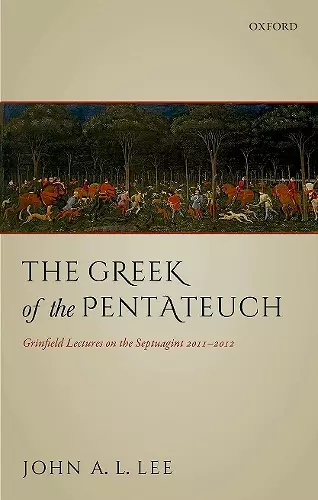The Greek of the Pentateuch
Grinfield Lectures On The Septuagint 2011-2012
Format:Hardback
Publisher:Oxford University Press
Published:8th Nov '18
Currently unavailable, and unfortunately no date known when it will be back

The nature of the Greek of the Septuagint has long been debated. Interference from the original Hebrew is present but scholars continue to disagree on its extent and significance. The Greek of the Pentateuch builds on John A. L. Lee's previous work on the vocabulary of the Pentateuch and its links with documentary texts, while offering a fresh perspective on the field. This timely and authoritative contribution argues that the language the translators used was fundamentally the Greek of their time and that they had full competence in it. The volume is divided into seven chapters which proceed through several topics: use of evidence, language variation, educated language, the presence of Greek idiom, the translators' collaboration, and freedom of choice in dealing with the Hebrew. A final chapter draws conclusions not only about the Pentateuch translators' knowledge of Greek, but about the translators themselves, their achievement, and their audience. The book presents a wide range of examples, comprising both vocabulary and syntax, from the Septuagint itself, Greek papyri of the period found in Egypt, and Classical and Koine Greek literature.
This volume will become required reading for anyone studying the LXX Pentateuch or, for that matter, the rest of the LXX corpus ... It is to be hoped that Lee's compellingly argued work will lead to a renewed appreciation for the language of the LXX. * Joshua Alfaro, Biblical Notes *
All in all, L.'s intimate familiarity with the Septuagint and his knowledge of Greek linguistics make this one of the best books on the Septuagint currently available, and a real treasure-trove for students of the Septuagint. * Jelle Verburg, Journal for the Study of the Old Testament *
While a technical read, this book is highly readable. Lee builds his case in a logical and convincing manner. Greek and Hebrew texts come with English translations... Lee's overall theme is helpful to understand in light of other literature on the Septuagint. The Pentateuch translators were adept at writing in Greek. Lee's methods for proving this is instructive and fascinating. Overall, his work is inspiring and impressive. * Brent Niedergall, Brent Niedergall *
Without exaggeration, read everything he writes. And I would include the recent volume, The Greek of the Septuagint, to the list of essential reading... it is nearly impossible to disagree with John Lee's conclusion... * Matthew J. Albanese, Wolfson College, University of Oxford, Trinity Journal *
This is an interesting and engaging book for anyone who wants to wallow in the mechanics of Greek, with an interest in the Pentateuch. It contains much material for those who want to consider uses of the Pentateuch (and indeed Septuagint) in the New Testament. The book pays homage to Greek, and is a delight for any enthusiast to read. * Cressida Ryan, Classics for All: Championing Classics in Schools *
This is a timely publication that continues and enhances Lee's stature as a leader in the field of Septuagint studies. * Larry Perkins, The Catholic Biblical Quarterly *
This is an excellent work of scholarship that points the way for future research. It repeatedly indicates questions that still need answering, and is full of examples of good practice. It should quickly become a standard reference in any work on Septuagint Studies and/or Koine Greek. * Dries De Crom, Bryn Mawr Classical Review *
ISBN: 9780198816133
Dimensions: 224mm x 145mm x 28mm
Weight: 584g
384 pages